
The Complete Guide to Swimming Pool Water Filtration: Everything You Need to Know
Key Takeaways
Effective pool filtration systems are essential for maintaining clear, safe, and hygienic swimming water by removing over 99% of contaminants.
The choice of pool filter type—sand, cartridge, or diatomaceous earth—affects maintenance requirements and filtration efficiency, thus influencing overall pool cleanliness.
Regular maintenance, including cleaning, backwashing, and monitoring filter pressure, is crucial for the longevity and performance of the filtration system.
Understanding the Importance of Pool Filtration
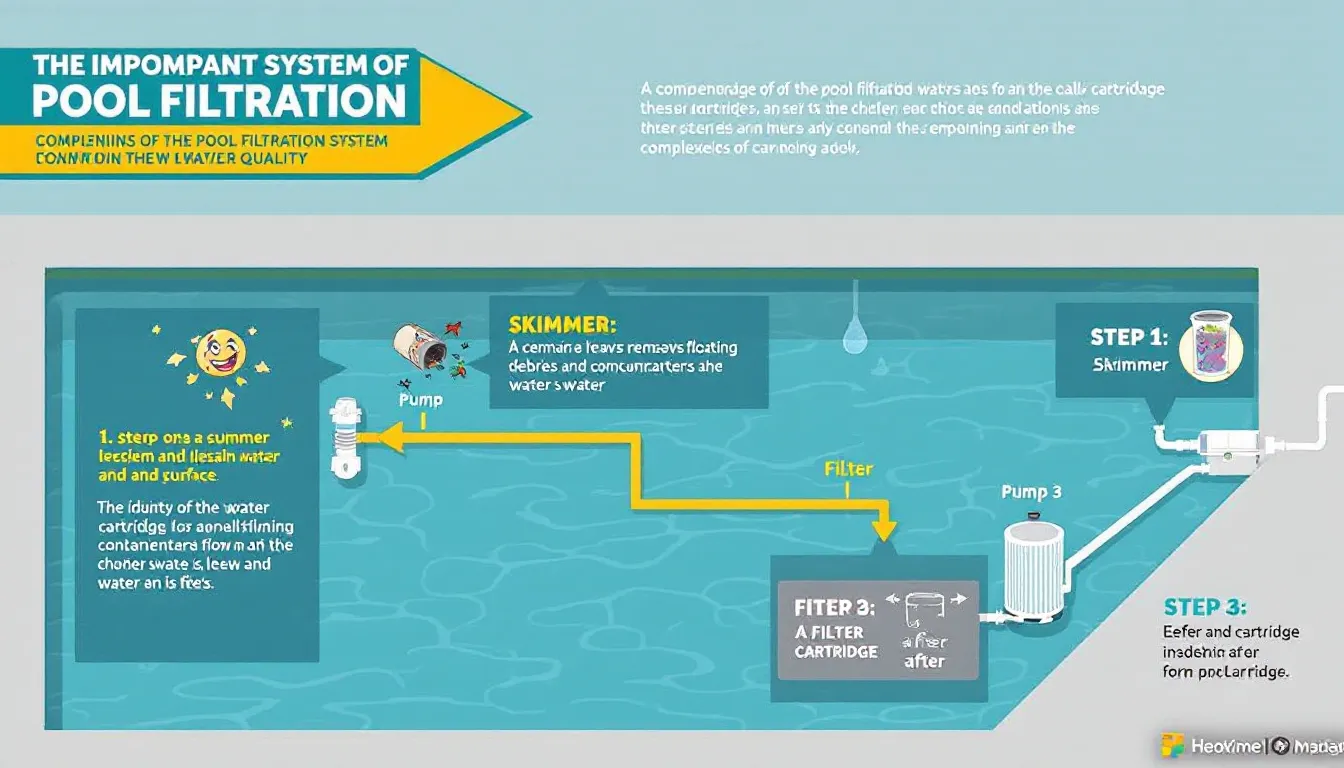
The heart of a clean and inviting swimming pool lies in its filtration system. Pool filters are essential for maintaining clear water and preventing harmful contaminants from accumulating. Effective pool filtration removes over 99% of unwanted particles, ensuring a healthier swimming environment. Imagine diving into a pool with crystal-clear water, free of debris and pathogens. That’s the magic of a well-maintained filtration system.
Pool filters are not just about keeping the water visually appealing; they play a crucial role in maintaining water clarity and hygiene. Pool filters help prevent waterborne illnesses by removing contaminants, ensuring your swimming pool remains safe for family and friends. Swimming pool pumps and filters maintain water cleanliness by removing contaminants, which ensures a clean and healthy swimming experience.
The Role of Pool Filters in Water Quality
Swimming pool filters work tirelessly to remove solid matter and microorganisms from the water, ensuring that every dip is safe and refreshing. A pool filtration system promotes health and safety by eliminating pathogens and bacteria, thereby preventing waterborne illnesses. Proper water circulation through the filtration system is essential for effectively distributing chemicals and preventing dead zones in the pool. It is recommended to run the pump and filtration system for 8-12 hours each day. This helps to ensure optimal water quality.
Regular skimming and filtering of pool water are necessary to prevent debris buildup, which can lead to algae growth and filtration issues. Here are a few tips to optimize the use of return jets, helping enhance water movement and coverage throughout the pool, contributing to valuable insights regarding improved water clarity and hygiene.
Effective filtration systems significantly enhance swimmer comfort and safety by maintaining a healthy swimming environment and proper water quality.
How Filtration Complements Chemical Treatments
Maintaining effective filtration alongside chemical treatments and proper pH levels is a critical factor for achieving crystal-clear pool water. The combination of proper filtration and chemical adjustments helps prevent issues like cloudy water in pools.
Cloudy pool water can often arise from inadequate filtration or imbalanced chemicals, including low pH. Maintaining an efficient filtration system and balanced chemical levels ensures a pristine pool’s water environment.
Types of Swimming Pool Filters
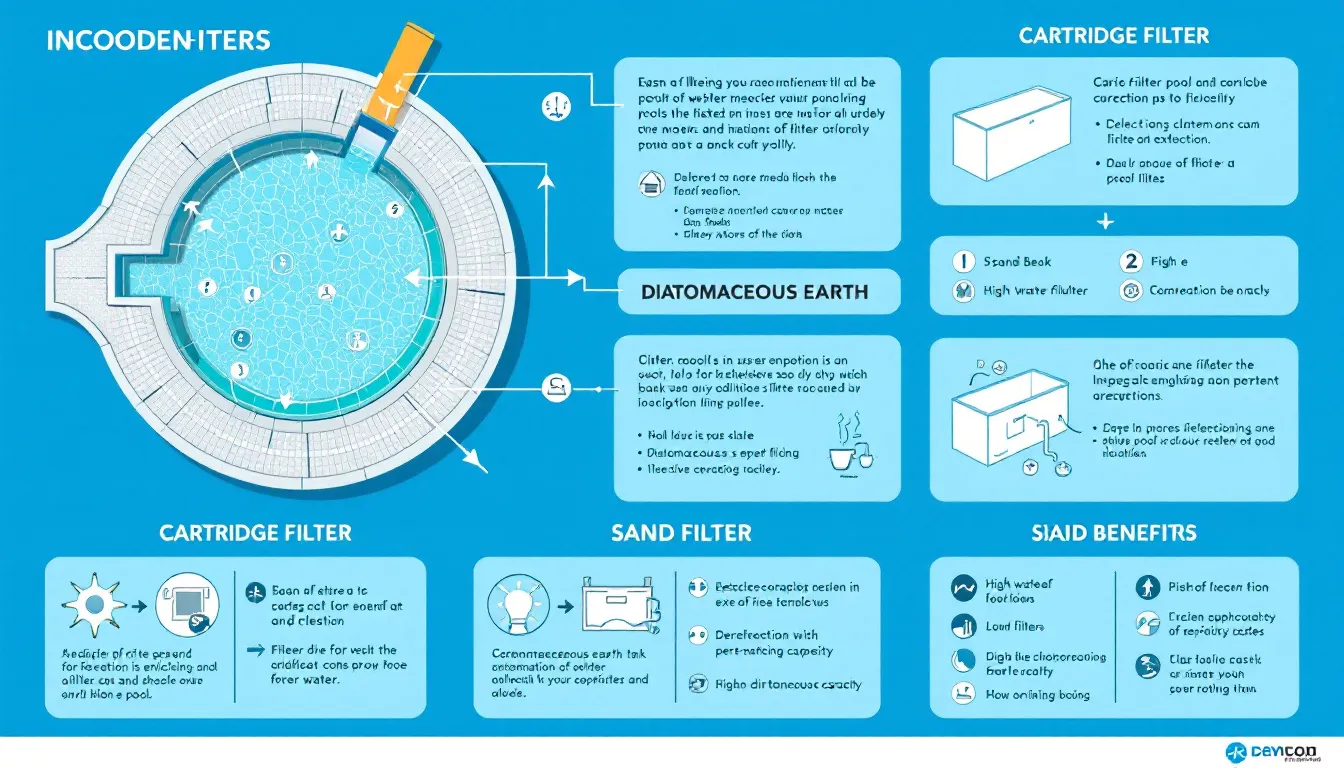
Choosing the right pool filter is a pivotal decision for any pool owner. Different primary types of pool filters, including sand, cartridge, and diatomaceous earth (DE) filters, offer distinct features and maintenance needs.
Known for their reliability and ease of maintenance, sand filters are a popular choice among pool owners. Cartridge filters are appreciated for their efficient filtration and low maintenance, often requiring only periodic cleaning and replacement of the cartridge.
DE filters provide superior water clarity due to their finer filtration capabilities, though they necessitate more frequent maintenance like backwashing and DE powder replenishment, especially in conditions of high ph.
Sand Filters: Reliable and Easy to Maintain
Sand filters operate by using water pressure to direct contaminants into a new sand bed, where they are filtered out. Key maintenance tasks for a sand filter include backwashing to remove trapped debris and regular monitoring of filter pressure.
These filters are ideal for various pool sizes and require regular backwashing to maintain performance. Known for their reliability and ease of maintenance, sand filters are a popular choice among pool owners.
Cartridge Pool Filters: Efficient and Low Maintenance
Cartridge filters can be cleaned by simply removing and hosing off the cartridge, making them user-friendly. These filters do not require backwashing, making them a water-efficient option for pool maintenance. A cartridge filter is easily cleaned by rinsing, which reduces maintenance needs compared to other filter types. Cartridge replacement is straightforward and enhances the longevity of your pool’s filtration system.
Efficient filtration and low maintenance make cartridge filters a popular choice for pool owners.
DE Filters: Superior Clarity with Diatomaceous Earth
DE filters excel in capturing fine particles, enhancing water clarity beyond what other filter types can achieve. Maintaining DE filters involves frequent backwashing and the need to replenish diatomaceous earth powder after cleaning.
Maintaining DE filters involves weekly backwashing and recharging with new diatomaceous earth after cleaning. While they require more maintenance, their ability to provide crystal-clear water makes them a top choice for many pool owners.
Choosing the Right Pool Filter System
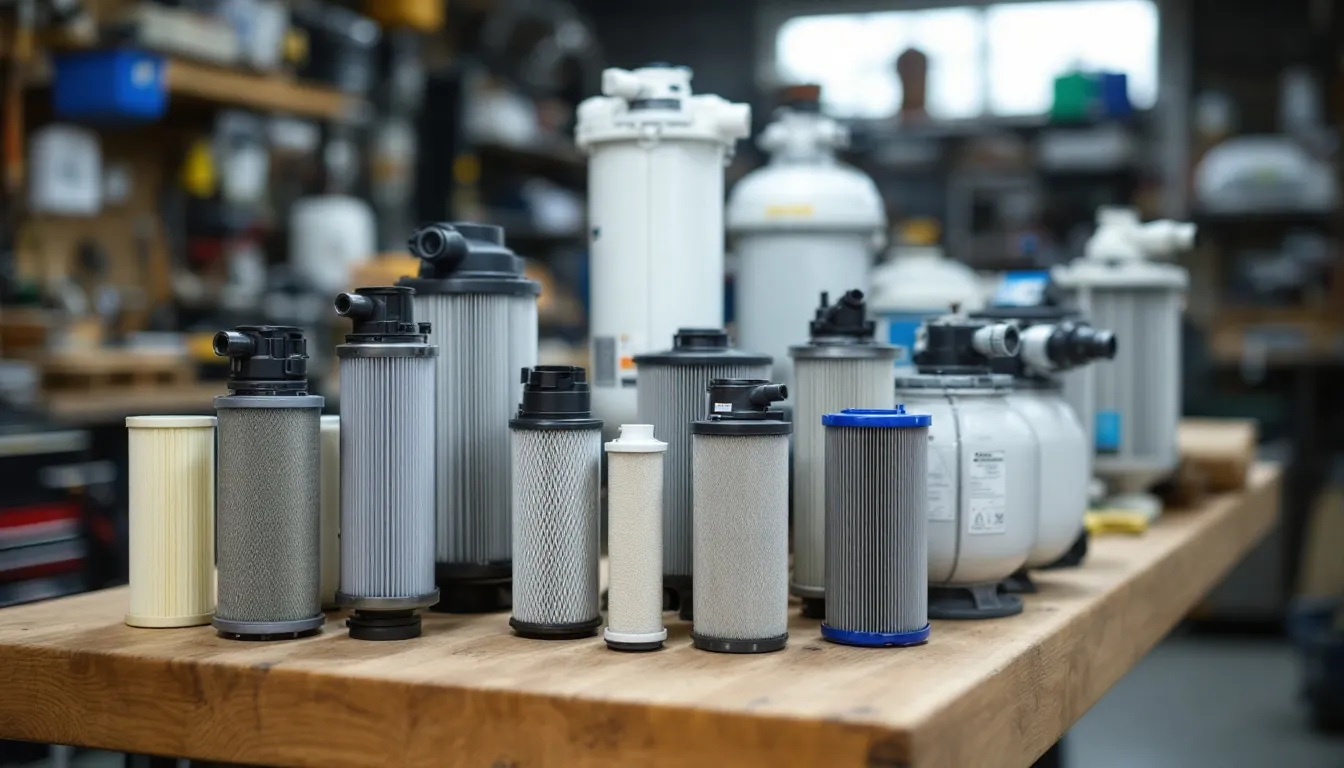
Choosing the right swimming pool filters ensures cleanliness and safety in the swimming area. The ideal pool filter should align with both the owner’s preferences and the pool’s specific requirements.
Pool dimensions dictate the required strength of pumps and filters, making them vital for optimal filter selection. Professional equipment suppliers can help customers choose suitable and efficient swimming pool pumps and filters.
Evaluating Pool Size and Volume
The flow rate of the filter must match the pool’s volume to ensure effective water circulation. Calculating pool volume involves measuring length, width, and average depth, which determines necessary filter capacity. Ideal for various pool sizes, sand filters require regular backwashing to maintain performance.
Running the pump for at least 8-12 hours daily during peak swimming season maximizes filtration effectiveness. It is generally recommended to run the pool pump for 8-12 hours a day to ensure proper water turnover.
Considering Energy Efficiency
Energy-efficient models lower electricity bills significantly while maintaining optimal filtration. Energy-efficient pool pumps lower operational costs and lower maintenance costs while maintaining effective water filtration.
Optimizing pump operation during low electricity demand times can improve filtration efficiency.
Assessing Maintenance Requirements
Different filter types require varying levels of upkeep; some may need frequent cleaning or media replacement. Maintenance demands of pool filters can influence a pool owner’s decision based on their availability and resources for upkeep.
Understanding the maintenance requirements of different pool filters helps owners choose a system that matches their willingness to perform regular maintenance.
Maintaining Your Pool Filtration System
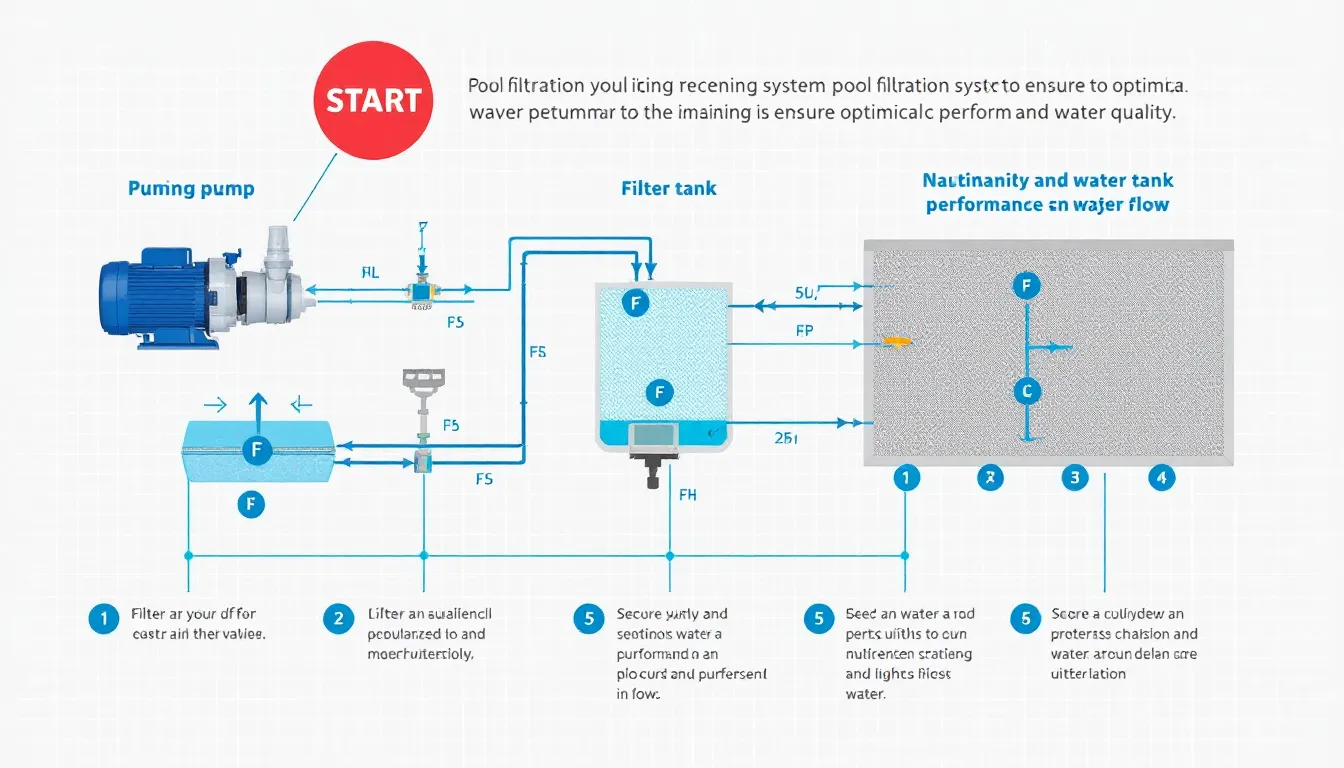
Regular maintenance checks on the filtration system can help prevent many common issues. Regular maintenance of your pool filtration system increases equipment longevity and ensures superior operational results. Proper maintenance can double the lifespan of pool equipment, ensuring efficient filtration.
The filtration system and pump and filter system are essential for circulating water and removing impurities in a pool, making its maintenance crucial.
Regular Cleaning and Backwashing
Regular pool filter cleaning prevents mechanical issues and maintains effective filtration. Inspecting and cleaning pool filter components regularly ensures optimal water flow. Regular cleaning of the filter and skimmer baskets significantly enhances pool filter performance.
Backwashing removes trapped dirt and maintains efficient operation in sand filters. Regular backwashing of sand filters cleans the sand media and ensures effectiveness. For optimal performance, more frequent backwashing of sand filters should occur when the pressure differential reaches approximately 8-10 psi.
Monitoring Filter Pressure
Monitoring filter pressure regularly helps identify when maintenance like cleaning or backwashing is necessary. Monitoring pressure levels helps address issues before they escalate, ensuring smooth and efficient filtration system operation.
Replacing Filter Media
Ignoring the replacement of filter media can lead to poor water quality and inefficient filtration. Replacing filter media ensures effective filtration and maintains clear, healthy swimming pool water.
Replace cartridge filters annually to ensure optimal performance. Clean or replace filter cartridges as recommended by the manufacturer or when water flow rate decreases.
Troubleshooting Common Filtration Issues
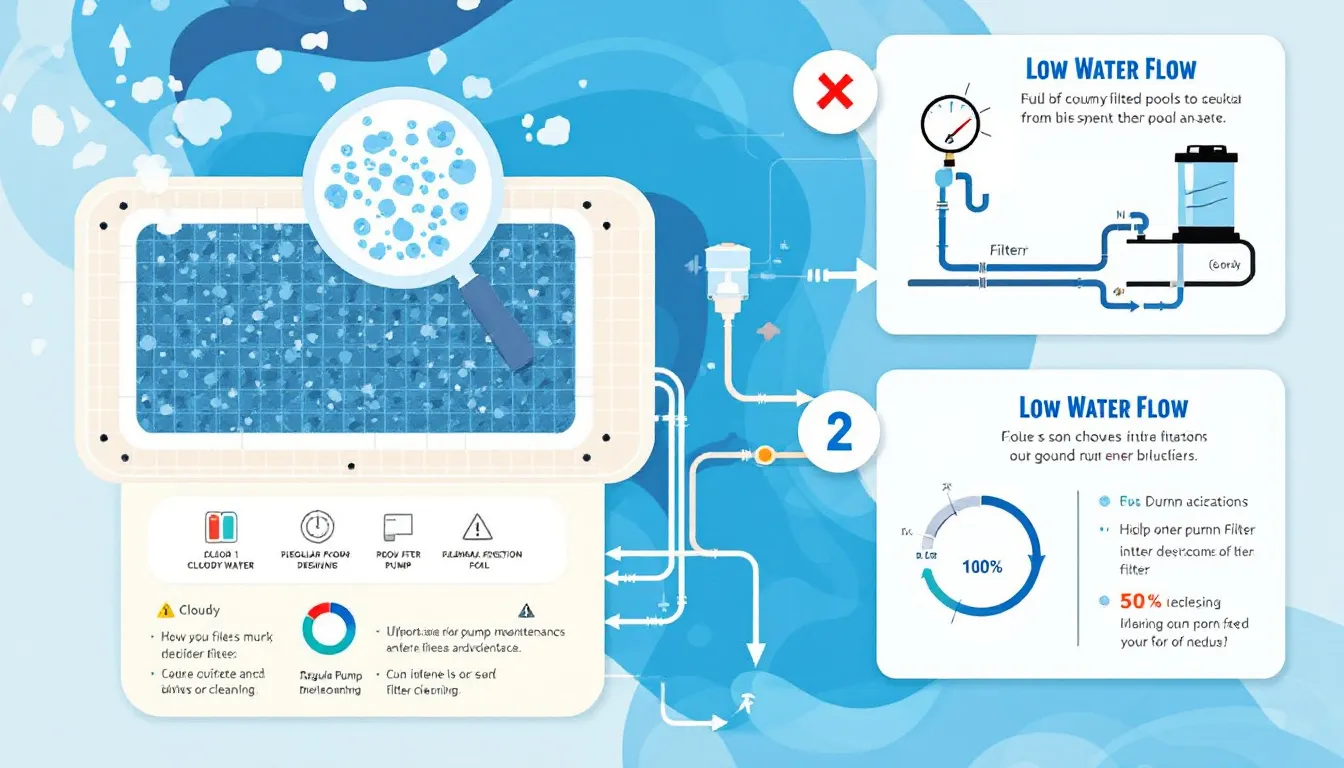
Obstructions like clogged skimmers, pumps, or valves can cause common filtration problems. Such issues lead to poor water quality and increased maintenance costs. Neglecting filter replacement results in inadequate water circulation and cloudy pool water.
Promptly addressing these problems keeps your pool clean and safe for use.
Dealing with Cloudy Water
A common cause of cloudy pool water is inconsistent water chemistry management, typically low chlorine levels. A malfunctioning pump system leads to unclear water, increased chemical usage, and higher energy bills.
Cloudy water can be caused by various factors, including poor filtration and inconsistent water chemistry. Proper water chemistry and a functioning filtration system ensure clear pool water and reduce operational costs.
Addressing Reduced Water Flow
Obstructions in the pump basket or closed valves diminish water flow in the filtration system. Clogged filters or accumulated debris significantly reduce the flow rate in pool filtration systems. Checking for debris accumulation in the filter restores normal operation. Blocked skimmer and pump baskets frequently cause diminished water flow in pool filtration systems.
To resolve reduced water flow, regularly inspect and clean filter media to prevent clogs.
Fixing Leaks and Noises
A damaged o-ring can cause leaks around the filter clamp, compromising the filter seal. Unusual pump sounds often indicate issues like cavitation or air leaks that need to be addressed. Unusual pump sounds indicate issues that require immediate attention.
Uncommon noises and reduced water movement often signal potential pump problems. Immediate action upon noticing pump issues prevents costly maintenance.
Enhancing Filtration Efficiency
Diatomaceous earth filters capture particles as small as 3-5 microns, providing exceptional water clarity. Variable-speed pool pumps lower energy usage and offer multiple working speeds for optimal efficiency. Single-speed pumps use more electricity over time, making them less energy efficient.
Early leak detection prevents extensive damage and costly filtration system repairs. Optimizing pump run times, using pool clarifiers and algaecides, and regular skimming and vacuuming enhance filtration efficiency.
Optimizing Pump Run Times
Adjust pump run times according to the season and pool usage to optimize filtration. Warmer months may require longer pump run times to manage increased debris and algae growth, while shorter run times may suffice in cooler months.
Energy-efficient or variable speed pumps reduce electricity usage while allowing for longer or adjustable run times. Regular skimming and vacuuming reduce the load on filtration systems, allowing pumps to operate more effectively within recommended run times.
Using Pool Clarifiers and Algaecides
Pool clarifiers are chemicals that enhance the clarity of pool water. They bind tiny particles for easier filtration, enhancing overall pool water clarity. Algaecides control algae growth, keeping the pool clean and safe for swimming.
Combining these pool chemicals with a well-maintained filtration system ensures a crystal-clear swimming environment.
Regular Skimming and Vacuuming
Consistent skimming reduces debris buildup on the water surface, helping maintain water quality. Daily skimming and regular vacuuming significantly reduce the debris load on the filtration system while removing debris. This keeps the pool clean and enhances the efficiency and lifespan of your filtration system.
Regular maintenance tasks like these are crucial to enjoying a pristine pool experience.
Summary
Maintaining a clean and clear swimming pool is a multifaceted task, but with the right knowledge and equipment, it becomes manageable and rewarding. Effective pool filtration, coupled with regular maintenance and chemical treatments, ensures your pool remains a safe and inviting space. From understanding the importance of filtration to choosing the right filter and maintaining it, this guide provides the essential steps to achieve optimal water quality. Dive into the joy of pool ownership with confidence, knowing you’re well-equipped to keep your pool in top condition.
Frequently Asked Questions
Why is pool filtration important?
Pool filtration is essential for keeping the water clear and free from contaminants, which promotes a healthier swimming environment. Without proper filtration, water quality deteriorates, leading to potential health risks.
How often should I clean my pool filter?
You should clean your pool filter regularly based on its type; sand filters require backwashing, cartridge filters need rinsing, and DE filters necessitate backwashing and DE powder replenishment. Regular maintenance ensures optimal performance and water quality.
What is the best type of pool filter?
The best type of pool filter ultimately depends on your specific needs; sand filters are reliable, cartridge filters offer low maintenance, and DE filters ensure the highest water clarity. Choose based on your pool size and maintenance preferences for optimal results.
How can I enhance the efficiency of my pool filtration system?
To enhance the efficiency of your pool filtration system, optimize pump run times, utilize pool clarifiers and algaecides, and consistently perform regular skimming and vacuuming. Implementing these practices will ensure cleaner water and improved filtration performance.
What should I do if my pool water is cloudy?
To resolve cloudy pool water, ensure your filtration system is working properly and balance your pool's water chemistry. Taking these steps will restore clarity to your pool.


